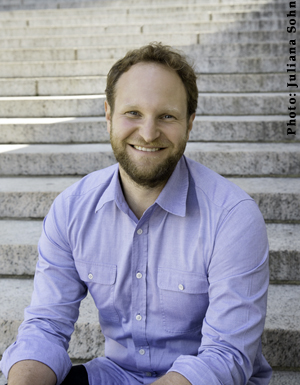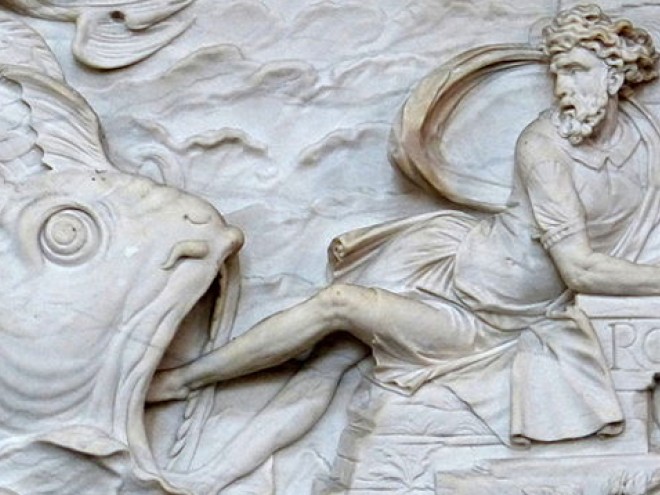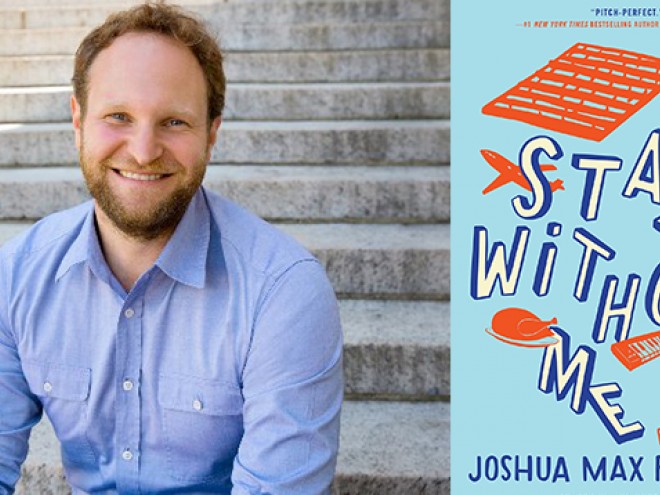Earlier this week, Joshua Max Feldman wrote about why he chose to write a novel based on the Book of Jonah and who would be on his Jewish Mount Rushmore. His debut novel,The Book of Jonah, will be published on February 4th by Henry Holt and Co. He has been blogging here all week for Jewish Book Council and MyJewishLearning.
 I began my first post with a Sarah Silverman joke, so let me start this one with a more traditional example of Jewish humor: Once upon a time in the Shtetl, a rabbi was in his study, pouring over the Talmud, when all of a sudden he noticed something he’d never seen before: A new word. Now, this rabbi had read the Talmud dozens of times, he practically knew the entire thing by heart, so for him to discover a new word was like a chemist tripping over a new element in the back yard. He ran out to tell his wife, dragged her in to look at the new word, and only when she brushed away the fly that had landed on the page did he realize what had happened.
I began my first post with a Sarah Silverman joke, so let me start this one with a more traditional example of Jewish humor: Once upon a time in the Shtetl, a rabbi was in his study, pouring over the Talmud, when all of a sudden he noticed something he’d never seen before: A new word. Now, this rabbi had read the Talmud dozens of times, he practically knew the entire thing by heart, so for him to discover a new word was like a chemist tripping over a new element in the back yard. He ran out to tell his wife, dragged her in to look at the new word, and only when she brushed away the fly that had landed on the page did he realize what had happened.
I tell this joke not only for the opportunity to write, “Once upon a time in the Shtetl,” but also because the tale is emblematic of a prominent feature of Jewish thinking: The borderline manic attention to individual words. Jewish scholarship examines texts on the most granular level, with the belief that each phrase, each word — even, in Hebrew, the letters making up the words — contain multiple layers of meaning that, like light refracting through a prism, can be revealed through careful study. We are very much the People of the Book in that for thousands of years we’ve been reading the same books — the Five Books of Moses and the rest of the Hebrew Bible—over and over, wrestling with and arguing over and reinterpreting the finest nuances. You can draw a fairly clear line from the Mishneh Torah to contemporary debates over whether genetically modified food is kosher.
As a writer, I’m often asked about “my process.” As a Jewish writer who just completed a novel loosely based on a book of the Bible, I’m often asked about the role of my religion in my writing. I can answer both these questions by pointing to this tradition in Judaism of granting the highest esteem to each and every word. I’m an inheritor of this tradition, and it is fundamental to how I write. Simply put, when I write, I do my best to give every word the attention I believe it deserves. “God is in the details” is an old saying that both nicely sums up my aesthetic view and points back to the scholarly tradition that shaped it. For a writer, it’s in the details where the mystery and majesty of art can be found; for a Torah student, it’s in the details where the mystery and majesty of the divine can be found.
So how does this belief in the value of individual words play out in practice? Well, here are the first few sentences of my novel, The Book of Jonah:
Jonah knew the 59th Street subway station well enough that he did not have to look up from his iPhone as he made his way among its corridors and commuters to the track. He felt lucky as he came down the stairs to the platform to see a train just pulling in — he boarded without breaking his stride, took a seat by the door of the nearly empty car, went on typing. A crowd of people flooded in at the next station, but Jonah felt he’d had a long enough day that he need not give up his seat. But then an older woman — frumpy, blue-haired, with a grandmotherly sweet face and a tiny bell of a nose — ended up standing directly before him, and Jonah decided to do the right thing and he stood.
I probably rewrote that paragraph dozens of times in the course of the two or three years I worked on the book. At various points, Jonah was looking at a Blackberry and not an iPhone; the name of the subway station was omitted, then specified, then moved from Union Square to up to 59th Street; a dash grew and was cut and then grew again between “empty car” and “went on typing.” The older woman in an early draft didn’t have “a grandmotherly sweet face and a tiny bell of a nose” but rather “a grandmotherly sweet button nose.”
I won’t get into the thinking behind these many changes, and I certainly won’t argue for the relative degrees of mystery and majesty the various drafts achieved. My point is that I write with the idea that even the slightest variations in a word or its punctuation can create ripples across the entire sentence, the entire paragraph — really, when you come right down to it, the entire book. The context, needless to say, is different, but like a yeshiva student, I try to respect the layers of every word.
Now, I should add that a lot of writers have this mindset, many of them non-Jews. But as I think about the connections between my religion and my work, this attitude toward words is one of the first things that comes to mind. I should also mention that there’s a real downside to writing this way: My writing process is a slow one, filled with constant reconsideration and reevaluation. Many times, I’ve felt like that rabbi in his study — believing I’ve stumbled onto something great, only to discover that I’ve been mistaken.
Like they say, God is in the details.
Joshua Max Feldman is a writer of fiction and plays. Born and raised in Amherst, Massachusetts, he graduated from Columbia University, and has lived in England, Switzerland, and New York City. The Book of Jonah is his first novel. Read more about him here.



